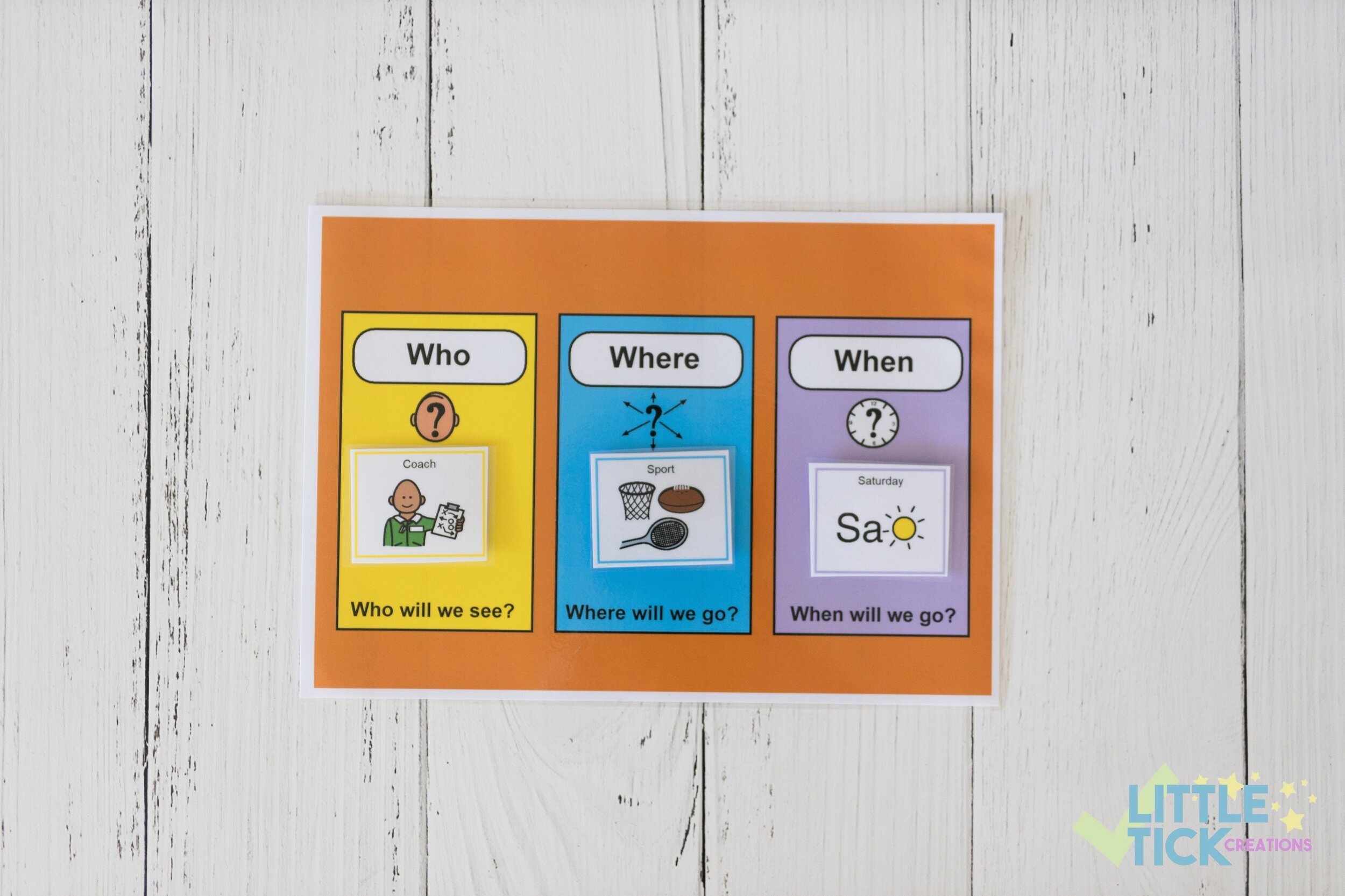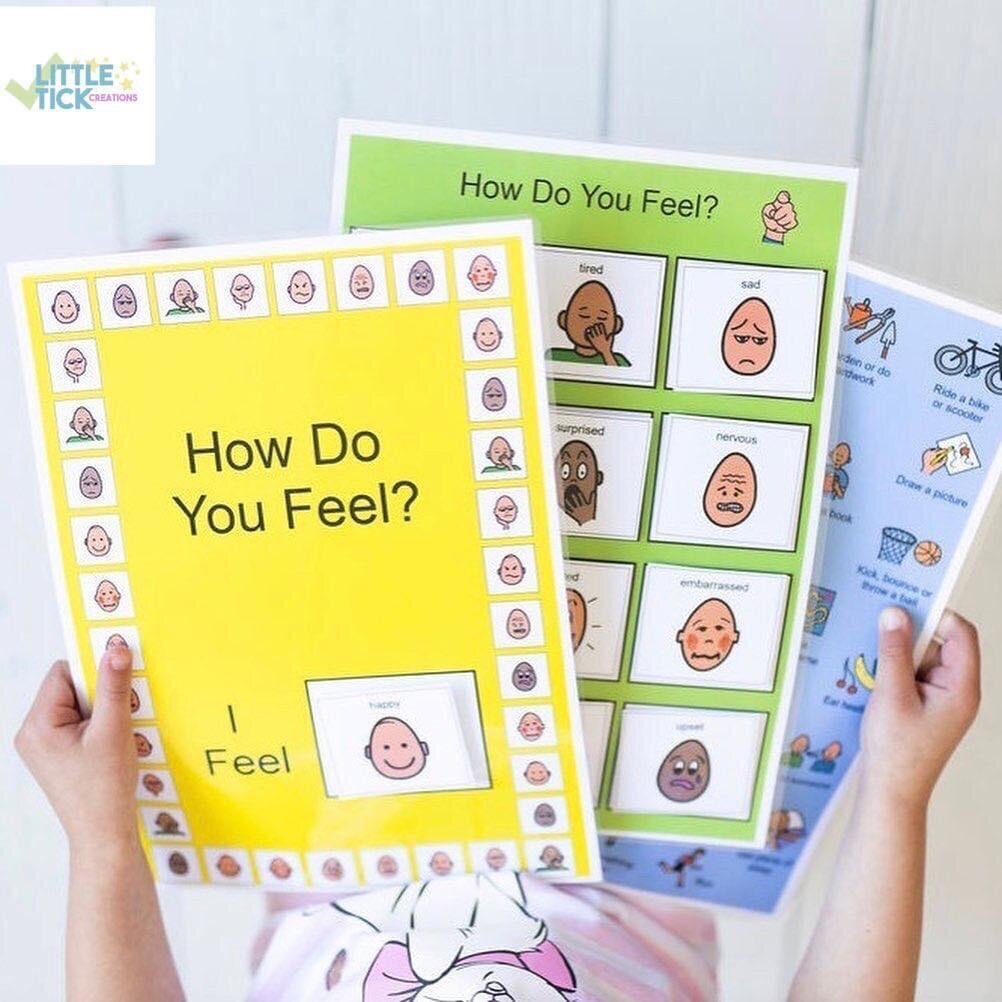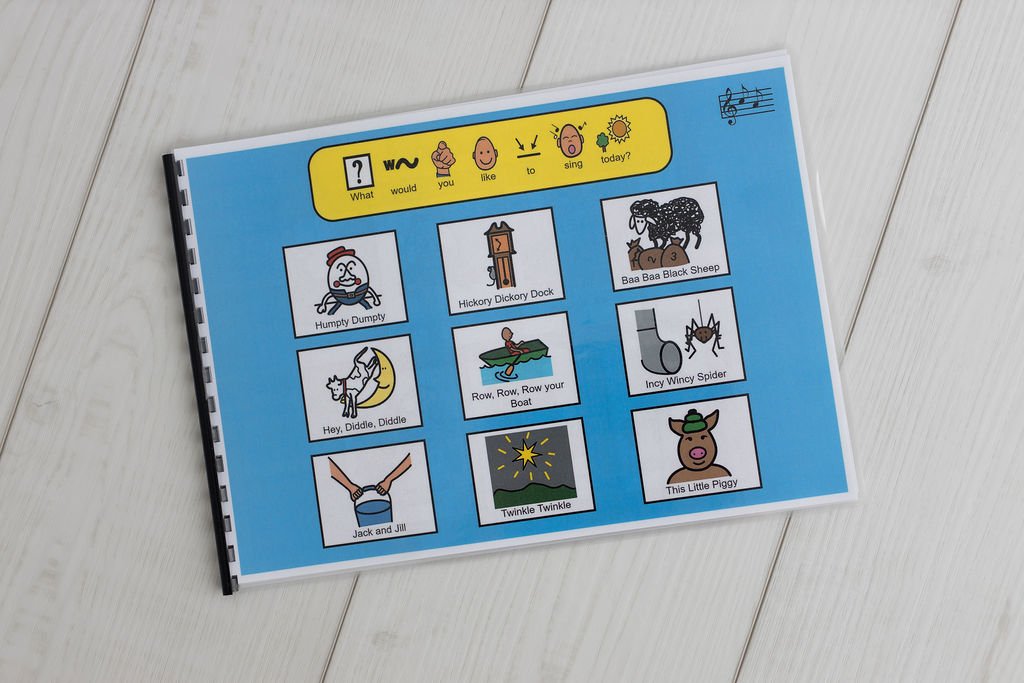 Image 1 of 6
Image 1 of 6

 Image 2 of 6
Image 2 of 6

 Image 3 of 6
Image 3 of 6

 Image 4 of 6
Image 4 of 6

 Image 5 of 6
Image 5 of 6

 Image 6 of 6
Image 6 of 6







WHO WHERE WHEN Visual Timetable
The ‘WHO-WHERE-WHEN’ visual timetable supports children’s understanding and comprehension to help anticipate and transition through common daily scenarios.
his pack is designed by specialist social workers to enhance vital speech and language skills. Answering “wh” questions encourages the development of both receptive and expressive language skills.
Wh-questions are certain types of questions we ask to get information about different things and are used frequently every day at home:
Who – asks about a person (eg. ‘Who will we see?’)
Where – asks about the location or destination (eg. ‘Where will we go?’)
When – asks about a time (eg. ‘When will we do this?’)
It is important that children are able to ask and answer Wh-questions, as they lay the groundwork for children to participate in conversations, demonstrate knowledge, and collect information about themselves and their world.
Using this resource, parents & carers can ask the questions and find the velcro visual answer card together with their child.
WHO are we seeing?
WHERE are we going?
WHEN are we going?
Parents and carers can assist in forming a sentence that makes sense to your child:
I will go with MUM to the SUPERMARKET on MONDAY.
We will see our FAMILY at a PARTY on SATURDAY.
TODAY, we will meet our FRIEND at the PARK.
Next THURSDAY, your DAD will take you to SCHOOL
AFTER SCHOOL, we have an APPOINTMENT with your DOCTOR
Repeat the questions and the final sentence and ask your child to repeat it.
The pack not only develops speech and language skills, it also supports transitions to activities and gives kids an understanding of what to expect including
WHO they should expect to see
WHERE they should expect to go
WHEN they should expect to do this activity.
Knowing what to expect reduces overwhelm and mental overload. It reduces anxiety and increases the likelihood that children will engage in positive behaviours.
This pack is evidence based, and not only supports transitions, sequencing, executive functioning skills but also is a powerful speech and language tool that can be used in the home.
**If you would like to add in FIVE personalised task/activity tabs to suit your personal routine, please add this option for an extra $5.00.
Please include in the notes section at checkout what you would like each extra tab to say.
(Please provide a description of the task/activity if required so a corresponding picture can be selected)**
The ‘WHO-WHERE-WHEN’ visual timetable supports children’s understanding and comprehension to help anticipate and transition through common daily scenarios.
his pack is designed by specialist social workers to enhance vital speech and language skills. Answering “wh” questions encourages the development of both receptive and expressive language skills.
Wh-questions are certain types of questions we ask to get information about different things and are used frequently every day at home:
Who – asks about a person (eg. ‘Who will we see?’)
Where – asks about the location or destination (eg. ‘Where will we go?’)
When – asks about a time (eg. ‘When will we do this?’)
It is important that children are able to ask and answer Wh-questions, as they lay the groundwork for children to participate in conversations, demonstrate knowledge, and collect information about themselves and their world.
Using this resource, parents & carers can ask the questions and find the velcro visual answer card together with their child.
WHO are we seeing?
WHERE are we going?
WHEN are we going?
Parents and carers can assist in forming a sentence that makes sense to your child:
I will go with MUM to the SUPERMARKET on MONDAY.
We will see our FAMILY at a PARTY on SATURDAY.
TODAY, we will meet our FRIEND at the PARK.
Next THURSDAY, your DAD will take you to SCHOOL
AFTER SCHOOL, we have an APPOINTMENT with your DOCTOR
Repeat the questions and the final sentence and ask your child to repeat it.
The pack not only develops speech and language skills, it also supports transitions to activities and gives kids an understanding of what to expect including
WHO they should expect to see
WHERE they should expect to go
WHEN they should expect to do this activity.
Knowing what to expect reduces overwhelm and mental overload. It reduces anxiety and increases the likelihood that children will engage in positive behaviours.
This pack is evidence based, and not only supports transitions, sequencing, executive functioning skills but also is a powerful speech and language tool that can be used in the home.
**If you would like to add in FIVE personalised task/activity tabs to suit your personal routine, please add this option for an extra $5.00.
Please include in the notes section at checkout what you would like each extra tab to say.
(Please provide a description of the task/activity if required so a corresponding picture can be selected)**
The ‘WHO-WHERE-WHEN’ visual timetable supports children’s understanding and comprehension to help anticipate and transition through common daily scenarios.
his pack is designed by specialist social workers to enhance vital speech and language skills. Answering “wh” questions encourages the development of both receptive and expressive language skills.
Wh-questions are certain types of questions we ask to get information about different things and are used frequently every day at home:
Who – asks about a person (eg. ‘Who will we see?’)
Where – asks about the location or destination (eg. ‘Where will we go?’)
When – asks about a time (eg. ‘When will we do this?’)
It is important that children are able to ask and answer Wh-questions, as they lay the groundwork for children to participate in conversations, demonstrate knowledge, and collect information about themselves and their world.
Using this resource, parents & carers can ask the questions and find the velcro visual answer card together with their child.
WHO are we seeing?
WHERE are we going?
WHEN are we going?
Parents and carers can assist in forming a sentence that makes sense to your child:
I will go with MUM to the SUPERMARKET on MONDAY.
We will see our FAMILY at a PARTY on SATURDAY.
TODAY, we will meet our FRIEND at the PARK.
Next THURSDAY, your DAD will take you to SCHOOL
AFTER SCHOOL, we have an APPOINTMENT with your DOCTOR
Repeat the questions and the final sentence and ask your child to repeat it.
The pack not only develops speech and language skills, it also supports transitions to activities and gives kids an understanding of what to expect including
WHO they should expect to see
WHERE they should expect to go
WHEN they should expect to do this activity.
Knowing what to expect reduces overwhelm and mental overload. It reduces anxiety and increases the likelihood that children will engage in positive behaviours.
This pack is evidence based, and not only supports transitions, sequencing, executive functioning skills but also is a powerful speech and language tool that can be used in the home.
**If you would like to add in FIVE personalised task/activity tabs to suit your personal routine, please add this option for an extra $5.00.
Please include in the notes section at checkout what you would like each extra tab to say.
(Please provide a description of the task/activity if required so a corresponding picture can be selected)**





